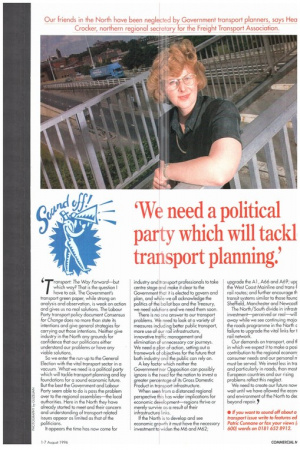'We need a political party which will tackl transport planning.'
Page 43

If you've noticed an error in this article please click here to report it so we can fix it.
CT ransport: The Way Forward—but which way? That is the question I
have to ask. The Government's transport green paper, while strong on analysis and observation, is weak on action and gives us no real solutions. The Labour Party transport policy document Consensus For Change does no more than state its intentions and give general strategies for carrying out those intentions. Neither give industry in the North any grounds for confidence that our politicians either understand our problems or have any viable solutions.
So we enter the run-up to the General Election with the vital transport sector in a vacuum. What we need is a political party which will tackle transport planning and lay foundations for a sound economic future. But the best the Government and Labour Party seem able to do is pass the problem over to the regional assemblies—the local authorities. Here in the North they have already started to meet and their concern and understanding of transport-related issues appear as limited as that of the politicians.
It appears the time has now come for industry and transport professionals to take centre stage arid make it clear to the Government that jt is elected to govern and plan, and while we all acknowledge the politics of the ballot box and the Treasury, we need solutions and we need them soon.
There is no one answer to our transport problems. We need to look at a variety of measures including better public transport, more use of our rail infrastructure, innovative traffic management and elimination of unnecessary car journeys. We need a plan of action, setting out a framework of objectives for the future that both industry and the public con rely on. A key factor which neither the Government nor Opposition can possibly ignore is the need for the nation to invest a greater percentage of its Gross Domestic Product in transport infrastructure. When seen from a distanced regional perspective this has wider implications for economic development—regions thrive or merely survive as a result of their infrastructure links.
If the North is to develop and see economic growth it must have the necessary investment to widen the M6 and M62; upgrade the Al , A66 and A69; upc the West Coast Mainline and trans-f rail routes; and further encourage th transit systems similar to those founc Sheffield, Manchester and Newcastl The North/South divide in infrastr investment—perceived or real—will away while we see continuing majo the roads programme in the North c failure to upgrade the vital links for t rail network.
Our demands on transport, and tl in which we expect it to make a posi contribution to the regional econom: consumer needs and our personal rr must be served. We invest less in tra and particularly in roads, than most European countries and our rising problems reflect this neglect.
We need to create our future now wait until we have allowed the econ, and environment of the North to de< beyond repair. 9




































































































